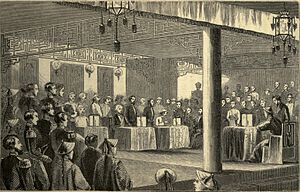1858 unequal treaty between Qing China and the UK, France, Russia, and the US
The Treaty of Tientsin, also known as the Treaty of Tianjin, is a collective name for several unequal treaties signed at Tianjin (then romanized as Tientsin) in June 1858. The Qing dynasty, Russian Empire, Second French Empire, United Kingdom, and the United States were the parties involved. These treaties, counted by the Chinese among the unequal treaties, opened more Chinese ports to foreign trade, permitted foreign legations in the Chinese capital Beijing, allowed Christian missionary activity, and effectively legalized the import of opium. They ended the first phase of the Second Opium War, which had begun in 1856 and were ratified by the Emperor of China in the Convention of Peking in 1860, after the end of the war.
